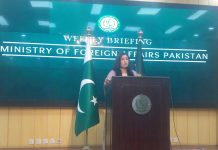The joy of Eid is double with the agreement between Pakistan and the IMF, credit should be given to the Prime Minister for averting the risk of default, the Prime Minister is determined to bring economic stability through the IMF agreement.
In a statement on Twitter, Prime Minister Shehbaz Sharif said that I am happy to announce that Pakistan has signed a staff-level agreement with the IMF. The Prime Minister said that this agreement will help in improving the foreign exchange reserves of Pakistan, it will help to bring economic stability and lead the country on the path of development.
Shahbaz Sharif said that he appreciates Finance Minister Ishaq Dar and the team of the Ministry of Finance, while he is grateful to the Managing Director of the IMF and his team for their support.After the IMF agreement, money will also be available from the Islamic Development Bank and the World Bank. The IMF agreement is a very positive development. We have got a 9-month program and we have got a new road map. will begin to decline.Prime Minister Shahbaz Sharif contacted the leaders of the coalition parties by telephone.
The Prime Minister discussed the political and economic situation of the country with the leaders of the coalition parties, Maulana Fazlur Rehman, Bilawal Bhutto Zardari, Khalid Hussain Magsi, Khalid Maqbool Siddiqui and Amil Wali Khan and informed about the IMF agreement.
The IMF says that a 9-month standby agreement has been concluded with Pakistan, the agreement will enable Pakistan to get financing from foreign countries and financial institutions. Funding for the social sector will improve while the agreement will increase tax revenue in Pakistan. The increase in tax revenue will increase funding for public development. According to the IMF, strict implementation of policies is necessary to solve the current economic problems while reforming the energy sector.Minister of State for Finance Dr. Ayesha Ghos Pasha said that the Managing Director of the IMF has had a sympathetic attitude towards Pakistan, he wants us to show progress on the ninth review. The meeting with FMD was positive, we are trying to complete the ninth review and move forward. Remember that while talking to the media in France, Prime Minister Shahbaz Sharif said that the management of the International Monetary Fund (IMF) The meeting with the director was very pleasant. MDIMF told that Pakistan has fulfilled all the conditions, now the program should go to the board and approve it. Significant changes were made in
These changes include additional tax measures of 215 billion rupees, reduction of expenditure of 85 billion rupees, withdrawal of amnesty on inflow of foreign exchange, removal of import restrictions, increase of 16 billion rupees in the allocation of Benazir Income Support Program and petroleum levy. Options to increase from Rs 50 to Rs 60 per liter are included. Economists say that credit should be given to the Prime Minister for averting the risk of default, the risk of default has been averted, Pakistan was close to default and could default in the next three to six months. Well-known businessman Amin Hashwani said that we should also see how we reached this situation. A deal has been done with the IMF but there has been a lot of damage in 8 months. We have learned that we should not be too smart and come up with new theories, the IMF has a clear formula that it follows, the problem is not the IMF, it is ours, we are taking money from the IMF, the IMF. He is not talking about our enmity, he is saying, clean your house, we are not fixing our house, so is it the IMF’s fault or is it ours? We have not done structural reforms, so today it is our turn. Well-known businessman and industrialist Mian Zahid Hussain said that signing an agreement with the IMF is a double joy of Eid for Pakistan, but three billion dollars will not come, but after the agreement with the IMF, money will also be received from the Islamic Development Bank and the World Bank. will go. Economist Shahid Ali said that the IMF agreement is a very positive development, a 9-month program has been found and we have got a new road map. We should and we should open imports. Economist Malik Bustan said that the IMF agreement is a great news on the occasion of Eid. If the markets will open, the dollar rate will immediately decrease by 5 to 10 rupees. Economic expert Khaqan Najib said that Pakistan has reserves of 4 billion dollars, 6 billion dollars have to be given in the next 6 years, 1 billion dollars will come from the IMF in July, the pressure on the reserves for a short period of time will end and Some burden of inflation will be reduced.Pakistan was trying to convince the IMF to release $1.1 billion from the 2019 Extended Fund Facility, which had been delayed since November last year. Officials were engaged in frantic efforts for the agreement, under which Prime Minister Shehbaz Sharif held back-to-back meetings with IMF Managing Director Kristalina Georgieva in Paris last week. Earlier, the IMF demanded that changes in the budget be made. Without IMF there can be no staff level agreement.
The IMF had asked Pakistan to revise the budget framework before approving the budget from the parliament.
Pakistan and the IMF agreeing on a budget framework could pave the way for approval of the annual budget, which includes revising the FBR’s tax targets to increase and reducing exchequer expenditure.
In the last 2 rounds of virtual talks on Friday night, hours-long talks took place between Pakistan and the IMF, in which Pakistan presented a revised budget framework with the IMF.

In this regard, Finance Minister Ishaq Dar revised the budget presented for the next financial year on June 9 and made significant changes in it. These changes include additional tax measures of 215 billion rupees, reduction of expenditure of 85 billion rupees, withdrawal of amnesty on inflow of foreign exchange, removal of import restrictions, increase of 16 billion rupees in the allocation of Benazir Income Support Program and petroleum levy. It includes options to increase from Rs 50 to Rs 60 per litre. According to the report, this was announced by the creditor. The deal is subject to approval by the IMF’s executive board in mid-July after a nearly 8-month delay, hampered by a severe balance of payments crisis and dwindling foreign reserves. The $3 billion funding over nine months is more than expected for Pakistan, as the country awaits release of the remaining $2.5 billion from the $6.5 billion bailout package agreed in 2019. The new standby agreement, which expires on Friday, is part of a program supported by Pakistan’s 2019 Extended Fund Facility, which expires at the end of June, said Nathan Porter, head of the IMF mission in Pakistan. Building on the efforts of the authorities.” Nathan Porter said Pakistan’s economy had faced several challenges in recent times, including devastating floods last year and rising commodity prices following the war in Ukraine. He said that despite the authorities’ efforts to reduce imports and trade deficit, the foreign exchange reserves have come to a very low level and the liquidity situation in the power sector is also serious. It said the new standby arrangement would support the authorities’ urgent efforts to stabilize the economy from recent external shocks, maintain macroeconomic stability, provide a framework for financing from multilateral and bilateral partners. The statement added that SBA will also create space for social and development spending by implementing prudent spending and improving domestic revenue to help meet the needs of the Pakistani people. The global lender said a stable policy implementation is key to overcoming Pakistan’s current challenges, including greater fiscal discipline, a market-based exchange rate to absorb external pressures, Further progress on reforms, particularly in the energy sector, includes helping to promote climate resilience, and improving the business environment. Now that Pakistan and the IMF have been able to reach a standby agreement on financial assistance measures, this has given Pakistan the near-term financial support it needs for the election period. The new government will have to negotiate a new program with the IMF. Although the country’s fiscal managers can finalize the staff-level agreement after IMF-approved changes to the federal budget for fiscal year 2024, the IMF Funds will not be released pending board approval, which could take anywhere from two weeks to two months. Sources in talks between Pakistan and the IMF said reaching a staff-level agreement was unlikely. There was no talk, but the board withheld approval for months, when there were financing or debt-related problems, such as the situation faced by Lebanon or Sri Lanka, at the request of the first International Monetary Fund (IMF). After increasing the target of 215 billion rupees to 94 trillion 15 rupees, the federal budget of 14 thousand 480 billion rupees for the next financial year 2023-24 was approved by majority opinion. A total of 9 amendments have been made in the Finance Bill, 8 of them have been added by the government and one by the opposition. billion, besides, under NFC, the provinces will get 5 thousand 390 billion instead of 5 thousand 276 billion. Finance Minister Ishaq Dar presented an amendment in Clause 3 of the Finance Bill, which was approved by the National Assembly by majority vote. Done. According to the amendment, a 3-member committee will be formed to resolve disputes including 62,000 pending cases worth 3200 billion rupees. FBR will not be able to file an appeal against the decision of the committee. It should be noted that the government made several changes in the federal budget presented on June 9 while trying to get the IMF agreement, which the finance minister informed the House that the government’s revenue collection target of 94 trillion. 15 billion and the total expenditure target has been set at 144 trillion 80 billion rupees, the share of the provinces has been increased from 52 trillion 80 billion rupees to 53 trillion 90 billion rupees.













